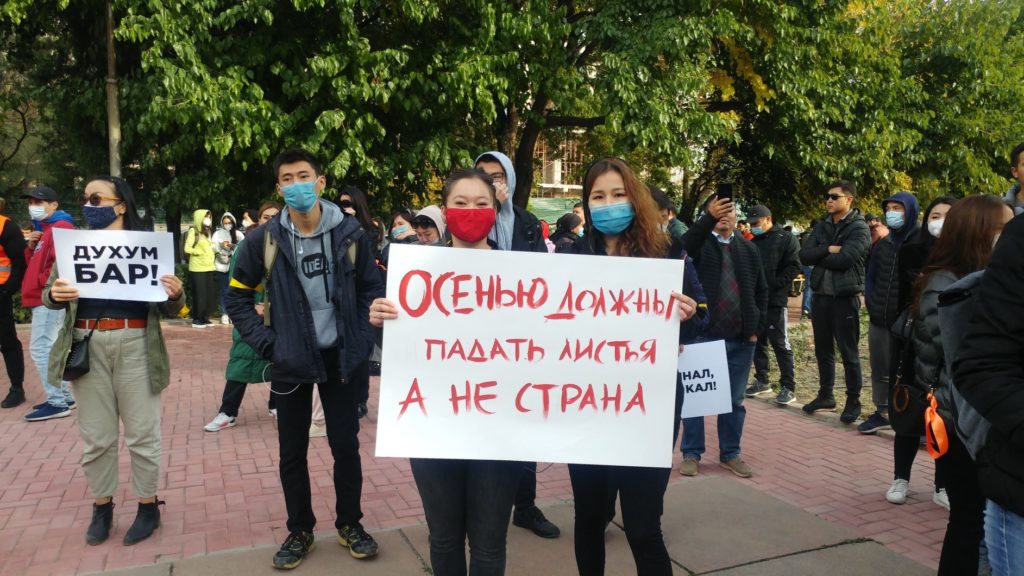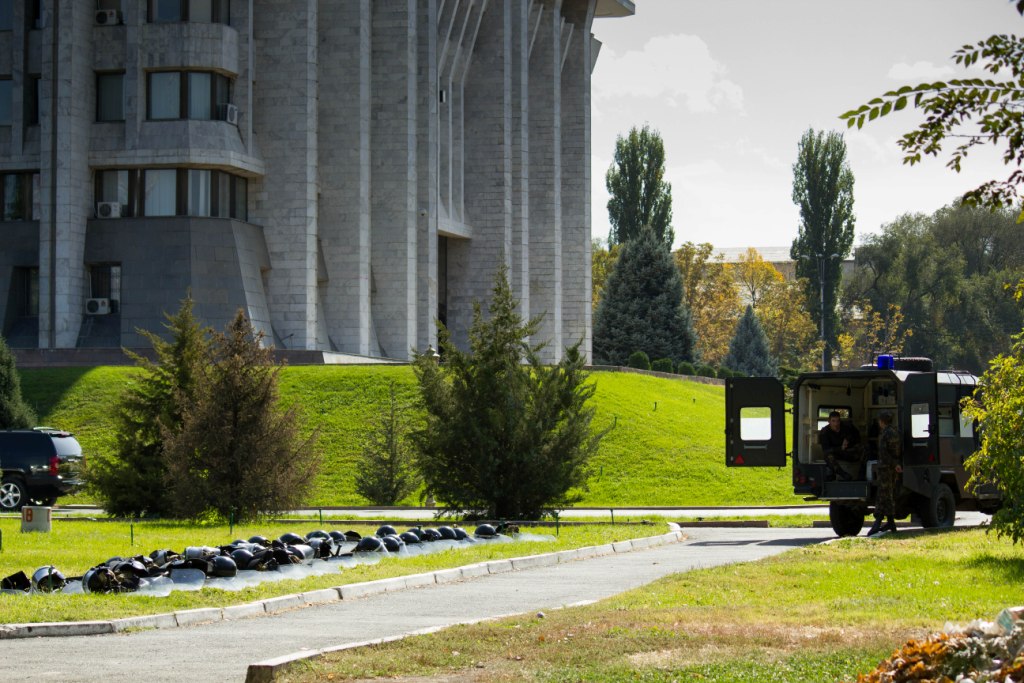ANALYSIS. The political landscape of Kyrgyzstan was tumultuous in 2020. Novastan Deutsch’s founder and editorial manager Florian Coppenrath analyses Sadyr Japarov’s path to the top and ventures an outlook on its global implications.
The following article appeared in the December 2020 issue of Zentralasien-Analysen. We republish it with the kind permission of the editors.
“Yesterday, police forces performed their duties perfectly … As President of State I repeat once again: calm in society should be the priority”, declared the then president of Kyrgyzstan Sooronbay Jeenbekov on 3 March 2020. The day before, between 1,500 and 3,000 people demonstrated for over eight hours in Bishkek for the release of Sadyr Japarov, a politician sentenced to over eleven years in prison for hostage-taking. The demonstration was broken up in the evening by the police as demonstrators were marching to the White House.
Want more Central Asia in your inbox? Subscribe to our newsletter here.
In retrospect, these events seem like a prelude to Japarov’s stellar rise from prison to the top of the executive system. The former advisor of the ex-president Kumanbek Bakiev (2005-2010) was released on 6 October and elected prime minister on 10 October. He also became interim president after the resignation of Jeenbekov and after the government’s spokesman, Kanatbek Isaev, stepped down. All these moves were also supported by a group of committed and sometimes aggressive demonstrators.
There was hardly any counter-protest. As early as March, many opposition-minded residents of Bishkek showed their lack of understanding for Japarov’s supporters, who were perceived as rural and alien. In October also, many people in Bishkek and abroad were wondering what this “Japarov phenomenon” was all about. The fact that he has the support of a significant part of the population cannot be denied. Yet, he is also a reflection of the rising divergence between social strata.
Revolution or coup?
Japarov, who resigned from his executive post on 14 November to run in the presidential election emerges as the clear winner of the political turmoil following the disputed and eventually annulled parliamentary election of 4 October. Like a Machiavellian prince, he and his supporters were able to seize the opportunity single-mindedly. Now, people close to Japarov occupy many key positions in the government, most notably his long-time comrades-in-arms Kamchybek Tashiev, now head of the GKNB security service. The outgoing parliament and the judiciary have also quickly sided with him.
Legally, many decisions made in Autumn are highly questionable, as the Venice Commission confirmed at the request of the Constitutional Chamber of the Supreme Court. According to the constitution, the term of the parliament ended five years after its first session i.e. at the end of October. Nevertheless, MPs passed new bills hastily and with numerous procedural violations. According to the electoral law and the electoral commission, the parliamentary election was supposed to be organised at the end of December, but has been postponed indefinitely. This is an illustration of the fact that even the highest of laws is only relevant if enough people and institutions commit to its validity.
Read more: Rise and fall… and rise: the career of Kyrgyzstan’s Sadyr Japarov
Japarov effectively pushed for a new constitution that would, in particular, increase the powers of the president, establish a vaguely defined, unelected kurultai (a traditional assembly) to control the executive and legislative branches, and invoke “traditional values” and “respect for elders”. A relevant draft was first presented on 17 November and promptly dubbed the “Khanstitutsiya”, the “Khan Constitution”, on social media. According to Japarov, now president, the new constitution will rid the state of corruption, but according to many observers, it will usher a new authoritarian chapter in Kyrgyzstan’s political history.
Whether the incidents in Autumn 2020 will be remembered as the third Kyrgyz revolution or as a coup d’état remains to be seen. In any case, they reveal the limits of the thought patterns that all too often manifest themselves in Russian, Western European and US analyses of Kyrgyzstani politics. We can only speak of a competition between different clans to a very limited extent here, and even less of a division between the north and the south of the country. Neither was Jarapov’s rise promoted by geopolitical actors, rather the opposite: Kyrgyzstan’s international partners have uniformly reacted sceptically to the change of president and now tend to adopt a wait-and-see attitude.
Such analytical motifs place the emphasis on local dynamics in Kyrgyzstan. They refer to partly existing distinctions of interests groups, but tend to be exotic in order to convey one thing to the readership abroad: ‘Something this crazy could not happen here’. Yet Kyrgyzstan has long been integrated into global processes and financial flows, and money stolen from the Kyrgyz state is often found on European bank accounts. Japarov’s success to date can also be described by globally quite common categories: as a right-wing populist episode in a neoliberal state.
National populism in sheep’s clothing
In a feature of the Japanese weekly Nikkei Asia, Kyrgyz political expert Asim Asimov explained Japarov’s success through a ‘Trump-effect’: “There are very few points on his résumé that show that he is the most suitable candidate for the position of prime minister or president. But he has very strong public support, especially among traditional nationalists and very conservative rural people in Kyrgyzstan”.
Japarov was imprisoned for taking the governor of the Issyk-Kul region hostage in 2013, in reaction to the nationalisation of the Kumtör, the country’s largest gold mine. He first spent several years in exile in Cyprus and was finally arrested on the Kyrgyz border in 2017 and sentenced to over eleven years in prison. He lost both his parents while in prison, and his son died in a motorbike accident. The tragedy in his biography feeds into a martyr narrative: he has already sacrificed a lot for his motherland; he started at the bottom and can thus understand the concerns of the ‘common people’ better than anyone else.
He himself uses such an anti-elitist narrative in which he opposes the ordinary people with the corrupt political class. For example, in his interview with Al Jazeera on October 20, he replied to the journalist’s concerns: “I am a democrat. Those who say otherwise are my opponents who did not get the positions they wanted”. He does not stand for a concrete political programme, but only for the fight against corruption, which is being exaggerated as a battle between good and evil.
Through his image and rhetoric, Japarov, the man of the people, fills a political vacuum. As researcher Asel Doolotkeldieva explained in the TV programme ‘Vecher Trudnogo Dnya‘ (A Hard Day’s Night) back in November 2020, a successful political communication campaign has already been created around his person over the past years via Youtube channels ‘in a very accessible language’. He stands for the non represented, the “working class without a job”: “this part of the population, these 35 percent of the poorest and maybe more from the middle class, who can not see any future prospects in this country. They think that Japarov really and sincerely represents their interests,” explained Doolotkeldieva.
Read more: Can Sadyr Japarov fulfil his promises?
This background also explains some of the opportunistic-looking political statements that cater to nationalist sentiments. One of Japarov’s first acts as prime minister was to reintroduce the indication of ethnicity (in Russian ‘natsionalnost’) in new identity cards and passports. The reference to the kurultai in the constitutional reform also refers to a supposed Kyrgyz tradition. Unlike Donald Trump, however, Japarov has so far refrained from overly aggressive rhetoric. He is making an effort to win the sympathy of foreign investors and donors, as well as the urban middle class. For example, the fence of the White House in Bishkek has been dismantled and some of his opponents, such as MPs Tilek Toktogaziev and Elvira Zurabaldieva, were co-opted in the government (though they are not part of the government composed in February 2021). Toktogaziev and Zurabaldiyeva had previously been vocal members of the youth-led ‘lustration movement’ for a renewal of the political class.
Japarov’s anti-elitism is populist, but so are his proposals of easy solutions to complicated problems and his selective understanding of the law. For example, the proposal of an economic amnesty for corrupt personalities: as reported in a journalistic investigation series, Raimbek Matraimov, a former customs official was accused of illegally taking at least 700 million US dollars out of the country, was briefly arrested at the end of October but released in exchange for a promise of repayment of almost 24 million US dollars. He was later detained again and finally released for the last time in April 2021. According to Japarov, this a “political decision”, because, imprisoned, such a person would not pay back a cent to the state.
Read more: Matraimov’s millions: the story of a Kyrgyz corruption scandal
The current political crisis in Kyrgyzstan is also a socio-economic one. Many analysts did not without reason draw attention to the gap between urban and rural populations and the poverty and lack of prospects. This also motivated the original protest against the parliamentary election. “A country of volunteers and vigilantes. All by themselves,” complained the journalist Aidai Irgebaeva on Facebook in early October. Whether it is caring for people infected with Covid-19 or protecting the city from being sacked, it is always up to the citizens alone, she said. The state is conspicuous above all by its absence, which on the one hand leads to a certain political competition, but also to a shortage of public services.
A shallow state
In their work Competitive Authoritarianism (2010), Steven Levitsky and Lucan Way introduced the concept of “rotten door transitions”: These “often happen quickly and look spectacular. Indeed, images of protesters taking the parliament while security forces look aside or join them have led to some of these transitions being called revolutions.” The political scientists refer mainly to the so-called colour revolutions of 2004-2005, and the events of the night of 5-6 October in Bishkek, when the White House was “occupied” by protesters within hours, also fit this pattern. According to the authors, such changes of political power rarely lead to a stable government and point above all to the weakness of the state, the party system and civil society.
The often chaotic political events in Kyrgyzstan can be explained by the widespread absence of the state. This reached its peak in the days after 5 October, when, for a time, not even the security function of the state was guaranteed. The months before showed how quickly the public health system was overwhelmed by the Covid-19 crisis and many affected people could only count on their own resources or contacts. A similar picture emerges in the education sector, where the private sector continues to grow and public schools are increasingly run down, as Aigul Abdubaetova pointed out in the previous issue of Zentralasien-Analysen.
Kyrgyzstan is an extreme example of a minimalist, neoliberal state. Appropriate reforms have been pursued with remarkable continuity since the early 1900s, albeit at a somewhat slower pace after 2010, commented the neo-left Kyrgyz portal Kyrgsoc.org on the legislative package “Towards New Economic Freedom and Development” adopted in April 2020. “Right now, in the context of the coronavirus pandemic, even the most market-oriented states are beginning to break neoliberal principles […] our government is blowing the whistle on its citizens and introducing harsh economic measures in order to obtain loans”, deplored Kyrgsoc’s editorial board.
According to Kyrgsoc, such reforms sometimes led to the “destruction of industrial complexes and factories” and the “degradation of agriculture”, with wealth concentrated in urban centres via investors and the service sector, especially in the capital Bishkek. This situation is strongly reflected in people’s daily lives: according to the Statistics Committee, at the country level in 2018, an average of just under 38% of households had a permanent sewage system. In Bishkek, the figure is over 97%. These divergent realities also illustrate the gap between those who support Japarov and those who do not.
There is no coherent economic policy in Kyrgyzstan, and in the absence of attractive economic sectors, the state itself becomes a resource. In his thesis, researcher Johan Engvall showed that “the logic of an investment market lies at the core of the Kyrgyz state’s operations”. In other words, state functions are traded like financial assets that guarantee a stable income to the ‘buyers’ who occupy them. It is no secret in Kyrgyzstan that government posts and seats in parliament (or favourable list position) are for sale. Instead of creating public goods, respective officials are first busy making private capital out of their positions.
Something similar seems to be happening after the recent incidents: “State posts are being grabbed by the same corrupt elites … According to insider information, the new team makes money by selling state posts as valuable resources,” described Doolotkeldieva on Twitter in November, for example. Thus, Japarov’s presidency is expected to bring continuity in the economic and social spheres. He will hardly be able to live up to the expectations many have of him today. He has already backtracked on his former hobby horse, the nationalisation of the Kumtör gold mine: there is not much gold left there anyway, he said.

The question of who benefits from the situation remains. There are many indications that the events of October were probably an organised shift of power. Some of the demonstrators were driven around the city in buses and served food rations and even cultural programmes. It is not yet clear who is behind this. Some talk of organised crime, others of the circle of ex-president Kurmanbek Bakiyev, who was overthrown during the April Revolution of 2010 after five years in office. In fact, Japarov and many of his circle held political positions under Bakiyev.
A growing political culture
After Japarov’s success in the presidential elections in January, one would be tempted to say that the once highly praised Kyrgyzstan is going back many years in its democratisation process. This not only would correspond to the somewhat condescending reflex of describing countries in transition as good or bad pupils, but also overlook underlying social dynamics.
Last but not least, the Covid-19 crisis rightly stirred up a lot of resentment towards the political class, but it also represents a collective experience of self-efficiency. It was volunteers who provided much of the social and medical care. Likewise, it was some 10,000 volunteer “Druzhinniki” who protected Bishkek from looting in the days following 5 October. For the researcher Erica Marat, such examples show “how a resilient society gains in complexity and organisation in order to resist the insolence of those in power”.
In an interview with the Akipress press agency, the former interim president Roza Otunbaeva also asserts that one cannot speak of an end of democracy in Kyrgyzstan. Rather, Kyrgyz society is experiencing “growing pains”: “There is a knowledgeable youth growing, the generation of the 21st century, they will not go backwards, but only forwards! We do not stand by idly, fight, take risks, make sacrifices, move and drive political processes forward.”
Paradoxically, even Japarov’s populism can be seen as a sign of such social processes. For all its instrumentalisation, populism is also a democratic phenomenon because it is an indirect recognition of the political role of the people. In an interview with The Economist, the then presidential candidate affirmed: “You [the people] can put up with things for one, two or three years and then drive out any president … You cannot establish a dictatorship in our country.”
Kyrgyzstan: a prime example of global social developments
The new constitution should act as a wake-up call for many in Bishkek. A first demonstration against the constitutional changes on 8 November gathered only about 20 people. The following demonstration on 22 November brought together about 500 people, according to media reports: a relatively large gathering by Bishkek standards, but much smaller than the protest against the results of the parliamentary election on 5 October. There was a certain political fatigue at the end of an already exhausting year.
The underlying causes of political instability in Kyrgyzstan are more likely to worsen. A stronger vertical power and the weakening of democratic institutions of control will only make the state more attractive as a playground for private interests and will hardly ensure more social justice within society. On this basis, “the people”, to whose will Japarov constantly appeals, can also quickly turn against him once the “post-revolutionary” honeymoon feeling has dispelled.
Read more: Kyrgyzstan: voters approve new constitution in referendum
Unlike Lukashenko, Japarov will hardly be able to draw on a public security apparatus that has been consolidated for over two decades. So the door remains rotten, to return to Levitsky and Way’s metaphor.
Processes determining social developments in Kyrgyzstan are no less shaped by global dynamics than they are in Europe. This is especially true for translocal interconnections of a media-communicative and financial-economic nature, of which Kyrgyz citizens are just as much a part as the inhabitants of other countries.
This also shows that it is much more fruitful and interesting not to constantly portray Kyrgyz politics as something that is “backward”, “chaotic” and “alien to us”. After all, phenomena like right-wing populism and neoliberalism are happening globally, even if they may take on particularly extreme features in Kyrgyzstan. But instead of being stuck in a “not yet sufficiently democratised” past, the country might as well find itself in a threateningly approaching future.
Florian Coppenrath
Founder of Novastan Deutsch
Translated from German by Manon Montant
Edited by Alexander Fuss
For more news and analysis from Central Asia, follow us on Twitter, Facebook, Telegram, Linkedin or Instagram.
 Between nationalist populism and neoliberalism: Kyrgyzstan and global political trends
Between nationalist populism and neoliberalism: Kyrgyzstan and global political trends 



